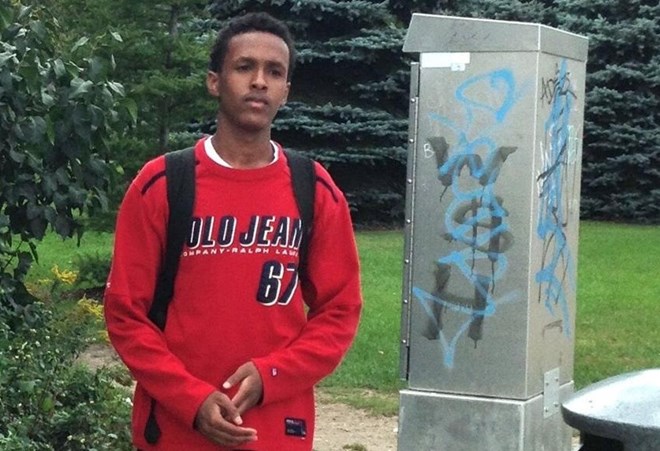Waterloo Region Record
Friday September 6, 2024
By Gordon Paul

File photo - Irshad Sabriye was fatally shot in 2019.
A family escaped violence in Somalia but then lost their son in a shooting in Kitchener.
“We fled Somalia’s war and conflict and found peace and solace in Canada, but the killing of our son has rekindled our past trauma,” Irshad Sabriye’s family wrote in a victim impact statement.
“We wish this is just a bad dream.”
Sabriye, 20, was shot six times on Nov. 26, 2019. The Kitchener man’s body was dumped on the side of Highway 7/8.
Abdulla Haredo, now 28, was convicted of manslaughter and kidnapping.
The Kitchener man was sentenced on Wednesday to eight years in prison. He spent four years in pretrial custody, but it was counted as six years due to harsh jail conditions, leaving him with just two more years to serve.
Sabriye and his family came to Canada in 2006. He graduated from Eastwood Collegiate Institute in Kitchener. He had four siblings.
His mother and a sister “could not bear seeing the empty bed where Irshad used to sleep,” the family wrote in a statement read aloud in Kitchener court by Crown prosecutor Brendan Gould.
“Therefore, they decided to leave Canada and have yet to come back, in the hope that they recover from the abrupt and deep pain of losing Irshad.”
Police found Sabriye’s body beside the Highway 7/8 Courtland Avenue on-ramp. A 911 caller said a car pulled over on the ramp, the driver exited and went to the back passenger side door. The caller then heard shots ring out.
Two hours later, police found Sabriye’s Nissan Sentra three kilometres away in a parking lot on Connaught Street in Kitchener. The bullet-riddled car was engulfed in flames.
Nine months passed before anyone was charged. No one was charged with murder.
The Crown’s theory is Sabriye, who was facing criminal charges, tried to rob Haredo of his gun so he could commit robberies to pay for a defence lawyer. Sabriye got only the clip.
Haredo asked another man for help in getting the clip back. The two men met Sabriye in the parking lot of Fairview Park mall in Kitchener.
“A series of frantic events begin to unfold after 2 a.m.,” Gould told the jury.
Haredo and the other man entered Sabriye’s Sentra. Haredo struck him three times in the head, likely with a gun, Gould said. With Sabriye incapacitated in the car and Haredo beside him, the other man drove the Sentra to Highway 7/8.
The Crown’s theory is Sabriye awoke and Haredo was unable to restrain him. That’s when the other man shot Sabriye, Gould said.
“The motive for all this is clear,” he said. “Irshad tried to steal Abdulla’s gun earlier that day. This was payback for what he had done.”
The man who allegedly fired the shots was never charged.
Haredo was convicted of manslaughter — a homicide with no intent to kill — suggesting Sabriye’s death was a foreseeable consequence of a kidnapping.
Police charged Haredo after searching residences on Vanier Drive — close to where Sabriye’s body was dumped — and Albert Street in Waterloo.
They seized two loaded handguns with ammunition, 14 grams of cocaine, 21 grams of fentanyl, prescription pills, digital scales, a drug press and $18,000. Police charged two men with drug trafficking.
Haredo had a tough upbringing, said defence lawyer Craig Zeeh. He spent most of his early life in a refugee camp in Yemen before coming to Canada as a teenager. He is not a Canadian citizen.
Justice Gerry Taylor asked Haredo if he wanted to say anything before being sentenced. He declined.
“The pain that the killing caused us is indescribable,” Sabriye’s family wrote. “We continue to grieve as a family. This has turned our lives upside down.
“Whenever someone leaves home, we have this feeling of fear and uneasiness that the individual may not come back.”